

Therapy for Inadequacy, Therapist for Feeling Inadequate. Inadequacy—not being good enough—is experienced by everyone at one point or another.
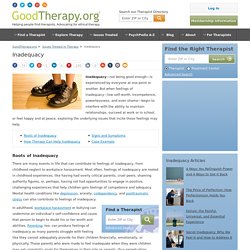
But when feelings of inadequacy—low self-worth, incompetence, powerlessness, and even shame—begin to interfere with the ability to maintain relationships, succeed at work or in school, or feel happy and at peace, exploring the underlying issues that incite those feelings may help. Roots of Inadequacy There are many events in life that can contribute to feelings of inadequacy, from childhood neglect to workplace harassment. Most often, feelings of inadequacy are rooted in childhood experiences, like having had overly critical parents, cruel peers, shaming authority figures, or, perhaps, having not had opportunities to engage in positive, challenging experiences that help children gain feelings of competence and adequacy.
Mental health conditions like depression, anxiety, codependency, and posttraumatic stress can also contribute to feelings of inadequacy. Signs and Symptoms How Therapy Can Help Inadequacy. Court%20Network%20Position%20Description%202013(1).pdf. Behaviour_management_resources_cu.pdf. Home. Children; the hidden victims of crime - Victoria's portal for all things volunteering. A special workshop for mentoring coordinators who supervise volunteers working with young people who have a parent or guardian who is incarcerated or involved with the criminal justice system will be held on 12 December in Melbourne.
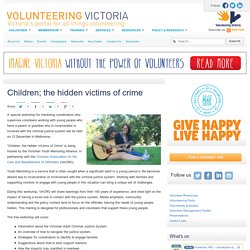
“Children; the Hidden Victims of Crime” is being hosted by the Victorian Youth Mentoring Alliance, in partnership with the Victorian Association for the Care and Resettlement of Offenders (VACRO). Youth Mentoring is a service that is often sought when a significant adult in a young person’s life becomes absent due to incarceration or involvement with the criminal justice system. Working with families and supporting mentors to engage with young people in this situation can bring a unique set of challenges. During this workshop, VACRO will share learnings from their 140 years of experience, and shed light on the impact of having a loved one in contact with the justice system. The free workshop will cover: When: Wednesday the 12th of December – 2pm – 4.30pm. ACSO Strategic Plan 2015-20. Fortune Society: Fighting For A Second Chance — A Night for NYC — Medium.
Fortune Society: Fighting For A Second Chance This story and the images were captured by Humans of New York while visiting The Fortune Society — a Robin Hood grantee aimed at supporting successful reentry from prison.
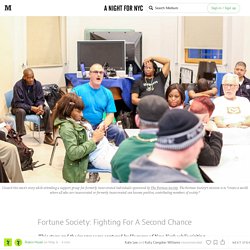
“I killed people, shot people, and robbed people. I’m not blaming society for my problems. These are things that I did. I was sentenced to 32 years to life. “Max has been helping me learn how to rebuild my relationships. “We’re trying to unlearn the years of self-protection that it took to survive in prison. Criminal Justice Diversion Program. Criminal Justice Diversion Program The Criminal Justice Diversion Program is governed by section 59 of the Criminal Procedure Act 2009.
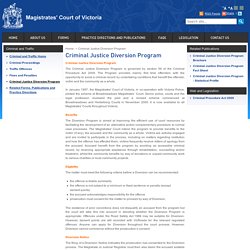
The Program provides mainly first time offenders with the opportunity to avoid a criminal record by undertaking conditions that benefit the offender, victim and the community as a whole. In January 1997, the Magistrates' Court of Victoria, in co-operation with Victoria Police, piloted the scheme at Broadmeadows Magistrates’ Court. Senior police, courts and the legal profession reviewed the pilot and a revised scheme commenced at Broadmeadows and Heidelberg Courts in November 2000. Positive Lifestyle Program. RESEARCH PROJECT TITLE: An exploratory analysis of The Salvation Army’s ‘Positive Lifestyle Programme’.
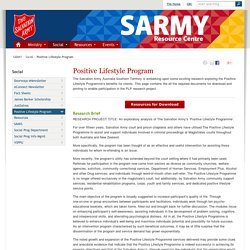
For over fifteen years, Salvation Army court and prison chaplains and others have utilised The Positive Lifestyle Programme to assist and support individuals involved in criminal proceedings at Magistrates courts throughout both Australia and New Zealand. More specifically, the program has been thought of as an effective and useful intervention for assisting those individuals for whom re-offending is an issue.
More recently, the program’s utility has extended beyond the court setting where it had primarily been used. Referrals for participation in the program now come from sectors as diverse as community churches, welfare agencies, solicitors, community correctional services, Department of Human Services, Employment Plus, Alcohol and other Drug services; and individuals through word-of-mouth often self-refer. . • Participants referring friends and family to complete the program. Free, Public Charter School.